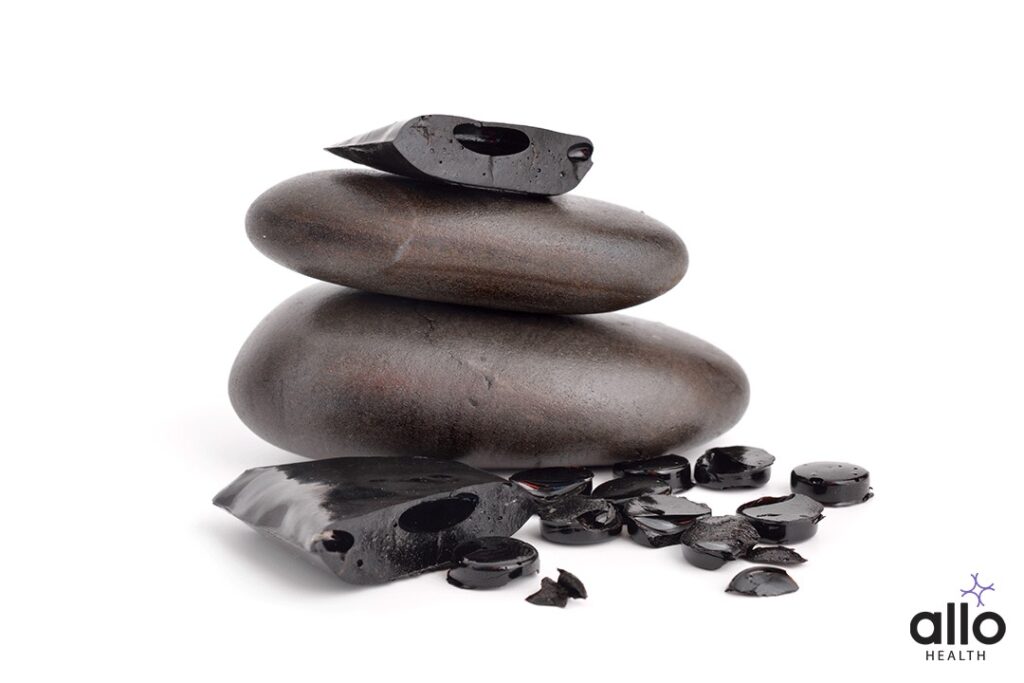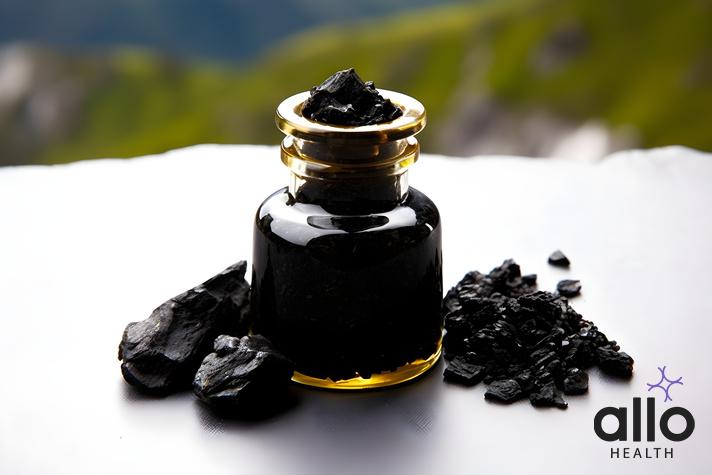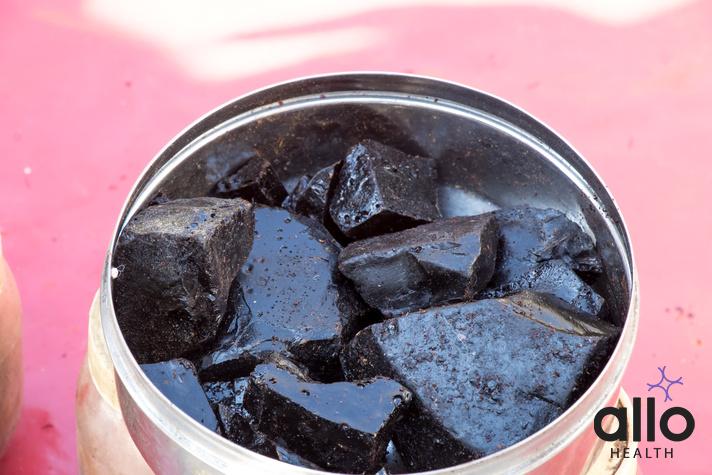Unveiling the Secrets of Shilajit: A Natural Resin with Ancient Roots

Allo Health is dedicated to personalized well-being, offering support and trusted information tailored to individual health goals. The platform emphasizes human-generated content, led by a distinguished medical team of experts, including physicians and sexual health specialists. Their commitment to credibility involves rigorous fact-checking, authoritative research, and continuous updates to ensure accurate, up-to-date information. Allo Health's unique approach goes beyond conventional platforms, providing expert-led insights and a continuous commitment to excellence, with user feedback playing a crucial role in shaping the platform's authoritative voice.

Dr.Sushma.V completed MBBS degree from BGS GIMS,bangalore
Why This Was Upated?
Our experts continually monitor the health and wellness space, and we update our articles when new information became available.
Updated on 24 June, 2024
- Article was updated as part of our commitment to diversity, equity, and inclusion.

"The following blog article discusses alternative medicine practices and their potential effects or benefits. However, it is important to note that the information provided is for general educational purposes only and should not be considered as medical advice or a substitute for professional guidance from a qualified healthcare professional. Before considering any alternative medicine practices or treatments, it is recommended to consult with a healthcare professional.
Book consultation
Alternative medicine encompasses a wide range of practices that may not have undergone rigorous scientific evaluation or received widespread acceptance within the medical community. The effectiveness, safety, and appropriateness of alternative medicine practices can vary significantly depending on the individual, their specific medical conditions, and other factors.
It is important to approach alternative medicine practices with caution and skepticism. Some practices may carry potential risks or interact with existing medical treatments. A healthcare professional can provide guidance based on your medical history, evaluate the available evidence, and offer informed advice regarding the potential benefits and risks of alternative medicine practices.
Individuals with specific medical conditions, allergies, or taking medications should exercise particular caution when considering alternative medicine practices. Some practices may have contraindications or adverse effects, and it is essential to discuss these potential concerns with a healthcare professional before pursuing any alternative treatments."
In the realm of natural supplements, one name that stands out for its rich historical background and purported health benefits is Shilajit. This blackish-brown resin, which emerges from the layers of rock in mountain ranges such as the Himalayas, Tibet mountains, and the Altai mountains, has been a cornerstone of Ayurvedic medicine for centuries. Known for its unique compound, fulvic acid, and a treasure trove of minerals, Shilajit has caught the attention of the health and wellness community worldwide. But what exactly is Shilajit, and why is it becoming increasingly popular as a dietary supplement? This article delves into the uses, benefits, and considerations surrounding Shilajit, aiming to shed light on its potential in modern health practices.
Historical Significance and Composition
Shilajit’s origins trace back to the ancient healing system of Ayurveda in India, where it was used to treat a myriad of conditions. This natural resin is believed to possess rejuvenating and healing properties, contributing to its longstanding use in traditional herbal medicine. The presence of fulvic acid, along with an abundance of minerals, makes Shilajit a unique supplement. Its formation over centuries through the decomposition of plant material and minerals in specific mountainous regions adds to its mystique and allure.
Potential Health Benefits of Shilajit
Despite its ancient use, scientific evidence of Shilajit’s benefits is still in its infancy, with most studies being preliminary. However, the existing research points to several potential health benefits:
- Alzheimer’s Disease Prevention: Studies suggest that fulvic acid in Shilajit may help in blocking the buildup of tau protein, which is linked to Alzheimer’s disease. While promising, further research is needed to establish Shilajit’s efficacy in this area.
- Fertility and Sperm Count: A notable study observed significant improvements in sperm count and motility in infertile males after Shilajit supplementation, indicating its potential to enhance male reproductive health.
- Cholesterol Management: Early research has shown that Shilajit can contribute to lowering cholesterol levels, thereby supporting heart health. However, more extensive human studies are required to confirm these findings.
- Altitude Sickness Relief: Shilajit is thought to alleviate symptoms of altitude sickness by reducing hypoxia and boosting the immune response, making it a companion for high-altitude adventurers.
- Collagen Synthesis: Preliminary studies suggest that Shilajit may promote collagen synthesis, essential for healthy skin, joints, and muscles.
Unlocking the Ancient Secrets of Shilajit: Benefits, Safety, and Usage Guide
Shilajit resin, a staple in Ayurvedic medicine, is celebrated for its antioxidant status content and potential health benefits, particularly for those with certain health conditions. Originating from the slow decomposition of plants in the Himalayan rocks, this sticky substance has been harnessed for centuries to enhance overall health and well-being. Here’s a concise overview of its top uses:
Key Uses of Shilajit
- Anti-Alzheimer Properties: Shilajit may slow the progression of Alzheimer’s due to fulvic acid, which prevents tau protein accumulation, potentially reducing brain cell damage.
- Boosting Testosterone: Studies show that shilajit can significantly increase testosterone levels, improving symptoms of low testosterone like fatigue and loss of muscle mass.
- Combating Chronic Fatigue Syndrome: By enhancing mitochondrial function, shilajit may help alleviate the extreme tiredness associated with CFS.
- Anti-Aging Properties: The fulvic acid in shilajit acts as a potent antioxidant, potentially slowing the aging process and improving longevity.
- Altitude Sickness Relief: Its mineral-rich composition makes shilajit beneficial for overcoming symptoms related to high altitudes, such as insomnia and lethargy.
- Iron Deficiency Anemia Treatment: Shilajit supplements can increase iron levels, addressing symptoms of anemia such as fatigue and irregular heartbeat.
- Male Infertility: Regular intake of shilajit may enhance sperm count and motility, improving male fertility.
- Heart Health: Preliminary studies suggest shilajit may reduce cardiac lesions and improve heart health, though it’s not recommended for those with active heart disease.
- Bone Health Improvement in Postmenopausal Women: Shilajit may help improve bone mineral density, potentially reducing the risk of osteoporosis and fractures in postmenopausal women.
While shilajit is generally considered safe, it should not be consumed in its raw or unprocessed form due to potential contaminants. Always opt for purified shilajit from reputable sources. The FDA does not monitor herbal supplements for quality or purity, so diligence in purchasing is crucial.
Who Should Avoid It
Individuals with conditions like sickle cell anemia, hemochromatosis, or thalassemia should avoid shilajit. Allergic reactions, though rare, can occur.
How to Use Shilajit
Shilajit is available in liquid and powder forms. The liquid can be dissolved in water or another liquid and consumed up to three times a day. Powdered shilajit can be taken with milk twice daily. However, the optimal dosage is not well-established, so consulting with a healthcare provider before use is advisable.
Shilajit offers a range of health benefits, from enhancing mental health to improving physical performance and overall vitality. As with any supplement, consider speaking with a healthcare professional to ensure its suitability for your health profile.
Understanding Potential Drug Interactions with Shilajit
While shilajit is a revered supplement in Ayurvedic medicine, known for its wide array of health benefits, its interactions with medications remain under-researched. This lack of evidence does not rule out the possibility of interactions, especially given shilajit’s complex composition and effects on the body.
Hormonal Medications: Shilajit’s potential to influence hormone levels warrants caution, particularly for individuals on hormone therapies or medications. Since these substances could amplify or mitigate the effects of hormone-related treatments, it’s crucial to consult healthcare professionals before combining them with shilajit.
Iron Supplements: Shilajit naturally contains iron, which can be beneficial for general health but may pose risks when combined with iron supplements. For those treating iron deficiency anemia with supplements or medications, adding shilajit might lead to excessive iron accumulation, potentially reaching harmful levels.
The cornerstone of safely incorporating shilajit into your health regimen lies in open communication with your healthcare provider. Discussing your current medication and supplement intake is essential to avoid potential interactions and ensure that shilajit supports your health goals without adverse effects.
Safety and Side Effects of Shilajit: A Brief Overview
Shilajit, known for its health benefits in Ayurvedic medicine, requires cautious use due to potential safety concerns and potential side effects. Here’s a condensed guide to ensure safe consumption:
Potential Safety Concerns:
- Iron Levels: Shilajit might increase iron in the body, which could be problematic for individuals with conditions like hemochromatosis.
- Hormonal Changes: It may alter hormone levels, including testosterone; individuals with hormone-sensitive conditions should be wary.
- Contamination Risks: Unpurified Shilajit could contain heavy metals or microorganisms, posing health risks.
Recommendations for Safe Use:
- Choose Purified Products: Opt for Shilajit that has been rigorously purified and certified by reputable third-party organizations.
- Consult Healthcare Professionals: Discuss with a healthcare provider before starting Shilajit, especially if you have pre-existing health conditions or are on medication.
- Monitor for Side Effects: Be vigilant about any adverse reactions and consult a doctor if any arise.
Special Precautions: Pregnant and breastfeeding women, children, and older adults should avoid Shilajit due to insufficient safety data.
To leverage Shilajit’s benefits safely, prioritize product quality and seek professional advice, paying close attention to anybody’s responses after consumption.
Exploring Shilajit: Benefits, Safety, and Practical Usage in Modern Wellness
Shilajit, a natural resin widely recognized in Ayurvedic medicine, boasts an array of health benefits, from boosting energy levels to potentially aiding in various health conditions. Found in the Himalayas’ rocks, it forms over centuries from decomposing plant matter, offering a potent mix of minerals and fulvic acid. Here’s a streamlined overview of its applications and safety considerations:
Potential Benefits of Shilajit
- Cognitive Health: Shilajit may slow or prevent Alzheimer’s disease progression through its fulvic acid content, which inhibits tau protein accumulation.
- Hormonal Balance: It could raise testosterone levels, addressing issues like fatigue and muscle mass loss.
- Energy and Fatigue: Shilajit might combat chronic fatigue syndrome by supporting mitochondrial function, and enhancing energy production.
- Aging: Its antioxidant properties may slow aging processes and improve overall health.
- Altitude Sickness: Beneficial for those at high altitudes, it may reduce symptoms like lethargy and insomnia through mineral and fulvic acid content.
- Anemia: Shilajit can help increase iron levels, potentially aiding those with iron deficiency anemia.
- Fertility: It may improve male fertility by increasing sperm motility and count and motility.
- Heart Health: Preliminary studies suggest it could protect against heart muscle injuries.
- High Altitude Adaptation: Shilajit assists in overcoming issues related to high altitudes, such as hypoxia and fatigue.
- Gastric Ulcers: Its anti-ulcer properties may offer a protective effect against stomach ulcers.
- Alzheimer’s Disease: Potential to serve as a dietary supplement for reducing Alzheimer’s symptoms through memory-enhancing properties.
Safety and Precautions
While Shilajit shows promise in various health aspects, it’s vital to proceed with caution:
- Purity: Opt for purified Shilajit to avoid contaminants like heavy metals and mycotoxins.
- Drug Interactions: The efficacy of Shilajit on hormone levels suggests possible interactions with hormonal medications. Additionally, its iron content might interact with iron supplements, necessitating caution.
- Consultation: Discuss with a healthcare provider before incorporating Shilajit into your regimen, especially if you’re on medication.
Usage Tips
- Shilajit is available in both powder and resin forms, suitable for consumption with milk or water.
- Ensure you’re using a product from a reputable source to avoid impurities.
Shilajit presents a natural option for enhancing wellness, with potential benefits spanning from improved energy and cognitive health to better heart and reproductive health. However, its integration into your health routine should be approached thoughtfully, prioritizing purified forms and consulting healthcare professionals to navigate its use safely and effectively.
How Much Shilajit Should You Take?
Determining the appropriate dose of Shilajit is challenging due to the variability in existing animal studies and the absence of a standard guideline. Consulting a healthcare provider is essential to ensure the supplement and dosage align with individual health needs.
Choosing the Right Shilajit Supplement: What You Need to Know
Shilajit, a natural substance revered in Ayurvedic medicine, is available in various forms, including capsules, powders, and liquids. Known for its distinct colors, ranging from white to black, and its potent odor, shilajit offers a unique blend of minerals and compounds beneficial for health. However, not all shilajit supplements are created equal, and caution is necessary when selecting the right product.
Understanding Shilajit Forms and Quality
- Forms of Shilajit: The effects of Shilajit supplementation can be found in capsules, shilajit powders, and liquid extracts. Each form is designed to cater to personal preferences and ease of use. While no definitive research points to one form being superior to others, personal choice and convenience often guide decisions.
- Color Variations: The color of oral shilajit supplementation can vary, indicating its origin and perhaps its mineral composition. Regardless of color, the quality and purity of the product are paramount.
- Odor: Shilajit has a distinctive smell that is a direct result of its rich mineral content and organic compounds. This odor is a natural characteristic of genuine shilajit.
Safety and Purity Concerns
- Contamination Risks: Some shilajit products may carry contaminants, including heavy metals, which pose significant health risks. It’s essential to opt for products that have undergone rigorous testing and purification processes to ensure safety.
- Purification Labels: Even products labeled as “purified” require scrutiny. Look for third-party testing and certifications to guarantee the absence of harmful substances.
Selecting a Shilajit Supplement
- Research and Recommendations: Seek out reputable brands and products recommended by healthcare professionals. Researching product reviews and company practices can provide insights into the quality of shilajit being offered.
- Certifications: Certifications by independent organizations can offer an additional layer of trust, indicating that the shilajit has been tested for purity and safety.
Legal and Ethical Considerations
- Marketing Regulations: Be wary of products marketed with claims of treating, curing, or preventing diseases. Such claims are not only misleading but also illegal for dietary supplements. The focus should be on supplements that support overall wellness without making unfounded health claims.
When exploring the potential benefits of shilajit, choosing the right supplement involves careful consideration of form, purity, and safety. Opting for products from reputable sources with third-party certifications can help ensure you receive a quality supplement that contributes positively to your health regimen.
Conclusion
Shilajit stands out in the natural supplement world for its ancient origins and potential health benefits. As research continues to unfold, the interest in Shilajit as a dietary supplement will likely grow. However, it’s important to proceed with caution and seek professional advice, given the current safety and efficacy research gaps. With its intriguing history and promising benefits, Shilajit may well be a valuable addition to the holistic health toolkit, provided it is used wisely and responsibly.
Most Asked Questions
-
What is Shilajit and where does it come from?
Shilajit is a natural resin found primarily in the rocks of mountain ranges like the Himalayas, Tibet, and the Altai mountains. It forms over centuries from the slow decomposition of plant material and is known for its unique composition, including fulvic acid and a variety of minerals.
-
What are the main health benefits of taking Shilajit?
The primary health benefits associated with Shilajit include its potential to prevent or slow Alzheimer's disease, increase testosterone levels, combat chronic fatigue syndrome, slow the aging process, relieve altitude sickness, treat iron deficiency anemia, improve male fertility, support heart health, and improve bone density in postmenopausal women.
-
Is Shilajit safe to take?
While Shilajit is generally considered safe for most people, it should not be consumed in its raw or unprocessed form due to potential contaminants like heavy metals and mycotoxins. Always choose purified Shilajit from reputable sources. Individuals with certain health conditions such as sickle cell anemia, hemochromatosis, or thalassemia should avoid it. Consulting with a healthcare provider before starting Shilajit is advisable.
-
How should Shilajit be taken?
Shilajit can be taken in liquid, powder, or capsule form. The liquid form can be dissolved in water or another liquid and consumed one to three times a day, while the powder can be taken with milk twice daily. However, the optimal dosage is not well-established, so it's important to consult with a healthcare provider for personalized advice.
-
Can Shilajit interact with other medications?
Although there is limited research on Shilajit's interactions with medications, its potential effects on hormone levels and iron content suggest it could interact with hormonal medications and iron supplements. Therefore, discussing all supplements and medications with a healthcare provider before taking Shilajit is crucial to prevent any potential interactions.






































